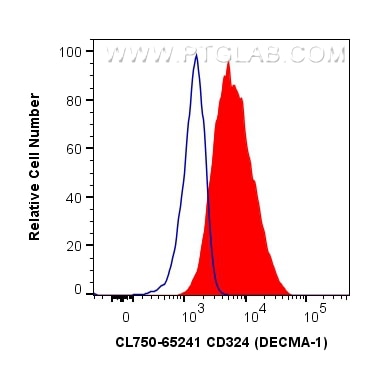Tested Applications
| Positive FC detected in | MDCK cells |
Recommended dilution
| Application | Dilution |
|---|---|
| Flow Cytometry (FC) | FC : 1 ug per 10^6 cells in 100 μl suspension |
| This reagent has been tested for flow cytometric analysis. It is recommended that this reagent should be titrated in each testing system to obtain optimal results. | |
| Sample-dependent, Check data in validation data gallery. | |
Product Information
CL750-65241 targets E-cadherin in FC applications and shows reactivity with human, mouse, canine samples.
| Tested Reactivity | human, mouse, canine |
| Host / Isotype | Rat / IgG1, kappa |
| Class | Monoclonal |
| Type | Antibody |
| Immunogen |
Mouse embryonal carcinoma cell line PCC4 Aza RI Predict reactive species |
| Full Name | cadherin 1 |
| GenBank Accession Number | BC098501 |
| Gene Symbol | E-cadherin |
| Gene ID (NCBI) | 12550 |
| RRID | AB_3084874 |
| Conjugate | CoraLite® Plus 750 Fluorescent Dye |
| Excitation/Emission Maxima Wavelengths | 755 nm / 780 nm |
| Excitation Laser | Red Laser (633 nm) |
| Form | Liquid |
| Purification Method | Affinity purification |
| UNIPROT ID | P09803 |
| Storage Buffer | PBS with 0.09% sodium azide, pH 7.3. |
| Storage Conditions | Store at 2-8°C. Avoid exposure to light. Stable for one year after shipment. |
Background Information
Cadherins are a family of transmembrane glycoproteins that mediate calcium-dependent cell-cell adhesion and play an important role in the maintenance of normal tissue architecture. E-cadherin (epithelial cadherin), also known as CDH1 (cadherin 1) or CAM 120/80, is a classical member of the cadherin superfamily which also include N-, P-, R-, and B-cadherins. It has been regarded as a marker for spermatogonial stem cells in mice(PMID:23509752). E-cadherin is expressed on the cell surface in most epithelial tissues. The extracellular region of E-cadherin establishes calcium-dependent homophilic trans binding, providing specific interaction with adjacent cells, while the cytoplasmic domain is connected to the actin cytoskeleton through the interaction with p120-, α-, β-, and γ-catenin (plakoglobin). E-cadherin is important in the maintenance of the epithelial integrity, and is involved in mechanisms regulating proliferation, differentiation, and survival of epithelial cell. E-cadherin may also play a role in tumorigenesis. It is considered to be an invasion suppressor protein and its loss is an indicator of high tumor aggressiveness.
Protocols
| Product Specific Protocols | |
|---|---|
| FC protocol for CL Plus 750 E-cadherin antibody CL750-65241 | Download protocol |
| Standard Protocols | |
|---|---|
| Click here to view our Standard Protocols |




